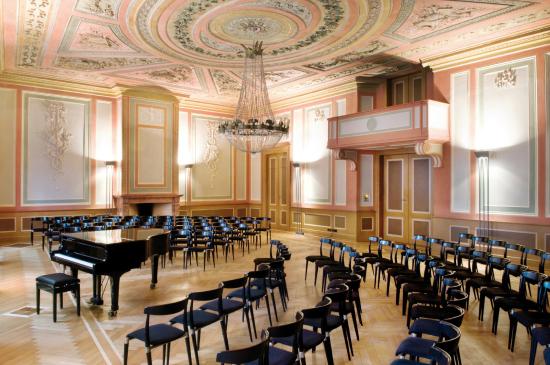Pop/rock/jazz or classical music in music education
While the training of classical music teachers has a long tradition, music education in pop/rock and, to a certain extent, jazz is still a relatively young discipline. Although initial steps have been taken, cooperation between the two departments could certainly be intensified.
A colleague from both disciplines recently asked me to write an occasional article on the subject:
Wishes from the pop/rock/jazz department
Sebastian Mäder is a freelance pop/rock musician and teaches at the music school
He teaches a drumset class in Mutschellen, heads the pop/rock/jazz department at the Rüschlikon music school and teaches skills in popular music at the HKB. It is very important to him that more teachers are well trained in the field of pop/rock/jazz. He is not primarily interested in teachers with different technical training, but in teachers who have stylistic skills in the style of music that primary school children listen to every day.
In this way, children and young people from (musically) educationally disadvantaged families can be picked up where they stand. Teachers should be able to make it so easy for primary school children with no prior knowledge to play together in a group that they can easily make music together on different instruments, start improvising and develop their own ideas. The focus should be on the joy of playing so that they get into a flow with each other, which in turn motivates them to continue playing. Because it is not about playing and singing correctly or incorrectly, but about simply doing it, there is no fear of failure when starting music lessons in this way.
He believes that from this point, music education bridges can be built in every stylistic direction and that such an introduction helps to get children interested in making music in the first place. In this way, they are more willing to get involved with other styles of music later on. The development of pop/rock/jazz skills could therefore ultimately also stimulate the classical field.
Audio production skills are also very important with the aim of being able to record your own musical ideas and sound concepts. To do this, music educators need a sound understanding of the different sounds of the various pop/rock/jazz subcultures.
Around 80% of prospective music teachers are trained in the classical music department, and Sebastian Mäder believes that there should definitely be more study places for music teachers in the pop/rock/jazz area. He is aware that there is competition with the classical department for financial resources. However, as many music school teachers will be retiring in the next five years, more music teachers urgently need to be trained.
Concerns in the Classics department
Wolfgang Pailer is a singer, classical singing teacher and retired secondary and grammar school music teacher. He observes with unease that singing teacher positions at renowned music schools and grammar schools are increasingly only being advertised for pop/rock/jazz singers. He fears that children and young people, who usually only listen to pop/rock music, will not be able to find their way to classical music if they never come into contact with classical music, even at subsidized music schools and grammar schools. He believes that these subsidized schools have an educational mission and that they should also introduce children and young people to music that they do not or hardly ever encounter in their daily lives. Only when they have heard and played classical music in the broadest sense can they decide for themselves from this experience which music ultimately fascinates them more. Then they could specifically choose a teacher from the classical or pop/rock/jazz department. As a music education association, the SMPV must draw attention to this problem and work to ensure that classical music is not neglected by music schools and grammar schools.
Find synergies
I think that this problem varies depending on the type of instrument.
The recorder player and the horn player, for example, certainly have less reason to fear losing students to colleagues from the pop/rock/jazz department than the singer and the guitarist. Perhaps the SMPV should advocate that for instruments that are suitable for this purpose, it should be stipulated that music students must also take lessons in the other department within a framework that is yet to be defined, or that all music students should be included in a project in which they can gain practical experience with the musical styles of the other department in a playful way.
Music education is not an exact science. It develops on the basis of its tradition, which naturally goes back further in classical music than in pop/rock/jazz, and is influenced by pedagogical fashions or new technical possibilities. But it is also constantly evolving through the people who teach music and through those who experience these lessons positively or negatively.
In conversation with Sebastian Mäder, I suddenly remembered the last Swissmedmusica symposium, where several speakers talked about how frighteningly many university students are unable to cope with performances and exams without beta blockers or similar. Perhaps the non-judgmental approach to music-making propagated by pop/rock/jazz teachers could also help us classical musicians to avoid developing a fear of failure in our quest for excellence. It is certainly worthwhile for both departments to exchange ideas on music education issues and to learn from each other without bias.
What is your opinion on this topic?








